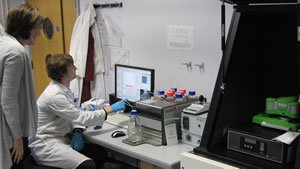JPK Instruments, a world-leading manufacturer of nanoanalytic instrumentation for research in life sciences and soft matter, is pleased to report on the first work from the University of Nottingham who have chosen the ForceRobot® 300 system for their School of Pharmacy.
The Laboratory of Biophysics and Surface Analysis (LBSA), a multidisciplinary research division within the School of Pharmacy at the University of Nottingham, is one of the world's leading scanning probe microscopy groups, having published several hundred ground-breaking papers over the last twenty years.
 Dr Stephanie Allen and one of her students, Oliver Croad, work with the JPK ForceRobot®300 system
Dr Stephanie Allen and one of her students, Oliver Croad, work with the JPK ForceRobot®300 system
Dr Stephanie Allen (Associate Professor and Reader in Molecular Biophysics) is an academic based within the LBSA. Her research interests focus in single molecule biophysics, and are driven by a desire to understand how biological processes work at the molecular level. Dr Allen also has an interest in exploring how this research can be exploited for the development of new therapeutic approaches within the pharmaceutical and biomedical sectors. Her work involves the application and development of a range of advanced biophysical tools such as Atomic Force Microscopy (AFM), the Quartz Crystal Microbalance (QCM-D), the Biomembrane Force Probe (BFP) and Optical Tweezers. Most recently, she has added a new advanced technique from JPK Instruments - the ForceRobot® 300 system, which provides the ability to automate force spectroscopy measurements.
Force spectroscopy is an approach that allows the real-time study of molecular interactions to the single molecule level. Originating from the broad field of AFM, force spectroscopy directly enables the measurement of forces between and within molecules. The sensitivity is high enough to characterize the force required to unfold a single protein molecule or the mechanical strength of a single biomolecular receptor-ligand bond.
Force spectroscopy measurements are being applied at Nottingham in a number of projects (funded by the BBSRC and Pharmaceutical Industry). In single molecule experiments, the group are studying the effects of bacterial DNA binding/remodelling proteins on the mechanical properties of DNA. Other projects are aimed towards gaining an improved understanding of the molecular basis of diseases, such as those related to the blood protein, von Willebrand Factor (vWF). The ability to record forces between a pair of interacting biomolecules is also being explored as a basis for new screening approaches e.g. for drug-discovery and/or biopharmaceutical formulation development.
While it is possible to perform such studies using conventional AFM instruments that are capable of performing force spectroscopy measurements, the experiments are not trivial to perform/optimize and can be very labour and time intensive; many hundreds/thousands of force measurements are typically required per experiment. The ForceRobot is an automated platform with great flexibility enabling the researcher to plan advanced experiments, with automated procedures allowing the continuous recording of thousands of force measurements and the change of key experimental variables within one experiment, such as measurement surface location, speed of approach and retraction of the probe, and also checks of laser alignment and calibration during the experiment.
Says Dr Allen, "working with the ForceRobot enables my research group to perform more experiments without tying them to the bench to manually adjust parameters between each measurement. The system shows a lot of potential to provide improved statistical data, which I hope will lead to important new results very soon." The ForceRobot 300 has many further options for fluidics and temperature control to enable more reproducible results than achieved on a basic AFM system.